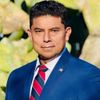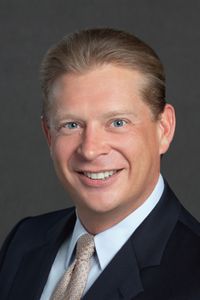Patrick Harris Sr. (Arizona)
Patrick Harris Sr. (Democratic Party) ran in a special election to the U.S. House to represent Arizona's 7th Congressional District. He lost in the special Democratic primary on July 15, 2025.
Harris completed Ballotpedia's Candidate Connection survey in 2025. Click here to read the survey answers.
Biography
Patrick Harris Sr. was born in Washington. He graduated from River Ridge High School. He earned an associate degree from South Puget Sound Community College and a graduate degree from Saint Leo University in 2006.[1]
Elections
2025
See also: Arizona's 7th Congressional District special election, 2025
General election
Special general election for U.S. House Arizona District 7
The following candidates ran in the special general election for U.S. House Arizona District 7 on September 23, 2025.
Candidate | % | Votes | ||
| ✔ |  | Adelita Grijalva (D) | 68.9 | 70,148 |
 | Daniel Butierez (R) | 29.4 | 29,944 | |
 | Eduardo Quintana (G) | 1.1 | 1,118 | |
 | Richard Grayson (No Labels Party)  | 0.5 | 537 | |
 | James Rose (No party preference) (Write-in) | 0.0 | 8 | |
 | Jeff Beasley (R) (Write-in) | 0.0 | 6 | |
 | G. Seville Hatch (R) (Write-in)  | 0.0 | 3 | |
 | Trista di Genova (No party preference) (Write-in) | 0.0 | 3 | |
| Avery Block (R) (Write-in) | 0.0 | 2 | ||
 | Daniel Wood (No party preference) (Write-in) | 0.0 | 2 | |
| Nathaniel Irwin Sr. (No Labels Party) (Write-in) | 0.0 | 1 | ||
 | Cheval Lavers (D) (Write-in) | 0.0 | 1 | |
| David McAllister (R) (Write-in) | 0.0 | 0 | ||
| Total votes: 101,773 | ||||
 = candidate completed the Ballotpedia Candidate Connection survey. = candidate completed the Ballotpedia Candidate Connection survey. | ||||
| If you are a candidate and would like to tell readers and voters more about why they should vote for you, complete the Ballotpedia Candidate Connection Survey. | ||||
Do you want a spreadsheet of this type of data? Contact our sales team. | ||||
Democratic primary election
Special Democratic primary for U.S. House Arizona District 7
Adelita Grijalva defeated Deja Foxx, Daniel Hernandez Jr., Patrick Harris Sr., and Jose Malvido Jr. in the special Democratic primary for U.S. House Arizona District 7 on July 15, 2025.
Candidate | % | Votes | ||
| ✔ |  | Adelita Grijalva | 61.5 | 38,679 |
 | Deja Foxx | 22.4 | 14,078 | |
 | Daniel Hernandez Jr. | 13.6 | 8,541 | |
 | Patrick Harris Sr.  | 1.5 | 925 | |
 | Jose Malvido Jr. | 1.1 | 687 | |
| Total votes: 62,910 | ||||
 = candidate completed the Ballotpedia Candidate Connection survey. = candidate completed the Ballotpedia Candidate Connection survey. | ||||
| If you are a candidate and would like to tell readers and voters more about why they should vote for you, complete the Ballotpedia Candidate Connection Survey. | ||||
Do you want a spreadsheet of this type of data? Contact our sales team. | ||||
Withdrawn or disqualified candidates
- David Bies (D)
- Victor Longoria (D)
Republican primary election
Special Republican primary for U.S. House Arizona District 7
Daniel Butierez defeated Jorge Rivas and Jimmy Rodriguez in the special Republican primary for U.S. House Arizona District 7 on July 15, 2025.
Candidate | % | Votes | ||
| ✔ |  | Daniel Butierez | 60.9 | 11,121 |
 | Jorge Rivas | 25.2 | 4,594 | |
 | Jimmy Rodriguez | 14.0 | 2,549 | |
| Total votes: 18,264 | ||||
 = candidate completed the Ballotpedia Candidate Connection survey. = candidate completed the Ballotpedia Candidate Connection survey. | ||||
| If you are a candidate and would like to tell readers and voters more about why they should vote for you, complete the Ballotpedia Candidate Connection Survey. | ||||
Do you want a spreadsheet of this type of data? Contact our sales team. | ||||
Withdrawn or disqualified candidates
- Raul Verdugo (R)
Green primary election
Special Green primary for U.S. House Arizona District 7
Eduardo Quintana defeated Gary Swing in the special Green primary for U.S. House Arizona District 7 on July 15, 2025.
Candidate | % | Votes | ||
| ✔ |  | Eduardo Quintana (Write-in) | 95.5 | 42 |
 | Gary Swing (Write-in)  | 4.5 | 2 | |
| Total votes: 44 | ||||
 = candidate completed the Ballotpedia Candidate Connection survey. = candidate completed the Ballotpedia Candidate Connection survey. | ||||
| If you are a candidate and would like to tell readers and voters more about why they should vote for you, complete the Ballotpedia Candidate Connection Survey. | ||||
Do you want a spreadsheet of this type of data? Contact our sales team. | ||||
Libertarian primary election
Special Libertarian primary for U.S. House Arizona District 7
No candidate advanced from the primary.
Candidate | % | Votes | ||
| Andy Fernandez Jr. (Write-in) | 100.0 | 19 | ||
Vote totals may be incomplete for this race. | ||||
| Total votes: 19 | ||||
 = candidate completed the Ballotpedia Candidate Connection survey. = candidate completed the Ballotpedia Candidate Connection survey. | ||||
| If you are a candidate and would like to tell readers and voters more about why they should vote for you, complete the Ballotpedia Candidate Connection Survey. | ||||
Do you want a spreadsheet of this type of data? Contact our sales team. | ||||
No Labels Party primary election
Special No Labels Party primary for U.S. House Arizona District 7
Richard Grayson advanced from the special No Labels Party primary for U.S. House Arizona District 7 on July 15, 2025.
Candidate | % | Votes | ||
| ✔ |  | Richard Grayson (Write-in)  | 100.0 | 1 |
| Total votes: 1 | ||||
 = candidate completed the Ballotpedia Candidate Connection survey. = candidate completed the Ballotpedia Candidate Connection survey. | ||||
| If you are a candidate and would like to tell readers and voters more about why they should vote for you, complete the Ballotpedia Candidate Connection Survey. | ||||
Do you want a spreadsheet of this type of data? Contact our sales team. | ||||
To qualify for the general election, primary write-in candidates for parties with continued statewide representation had to receive enough votes to meet or exceed the number of nominating petition signatures required to file for the primary.[2] In the 2025 special election, the Democratic, Libertarian, and Republican parties were subject to this rule.[3] Libertarian write-in candidate Andy Fernandez Jr. did not meet the required 376 minimum write-in votes, so he did not advance to the general election.[4]
Primary write-in candidates for recognized parties that did not have continued statewide representation did not need to meet a minimum vote count.[2] Eduardo Quintana (G) and Richard Grayson (No Labels Party) advanced to the general election after receiving the most write-in votes in their primaries.
Endorsements
Ballotpedia did not identify endorsements for Harris in this election.
Campaign themes
2025
Ballotpedia survey responses
See also: Ballotpedia's Candidate Connection
Patrick Harris Sr. completed Ballotpedia's Candidate Connection survey in 2025. The survey questions appear in bold and are followed by Harris' responses.
| Collapse all
I’ve lived the flaws of our rigged system, from economic hardship to healthcare obstacles, and I’ve created a bold solution to fix it: Capitated Capitalism (aka “Cap The Cap”). It’s a nonpartisan policy that ends extreme wealth hoarding and reignites the American Dream for everyone else. While politicians complain about the problem of hoarded wealth/billionaires, I created the solution and wrote the legislation. You can read the legislation and sign the petition at capthecap.com.
I’m running for Congress because we need real-world problem solvers, not partisan performers. I created Cap The Cap to serve the people, not special interests. The best way to protect Cap The Cap from corruption is to lead it through Congress myself.- Cap The Cap is a bold, nonpartisan economic policy that caps individual wealth at $1 billion and requires excess wealth to keep circulating in the economy. It ends extreme hoarding, which is the root cause of national collapse throughout history (Rome, France, and Russia all fell due to wealth concentration). Cap The Cap lowers costs, fights inflation, increases wages, grows the economy, stabilizes retirement savings, funds public programs, reduces per capita taxes, and puts us on a path to pay down the national debt. I’ve built a free, interactive AI at CapTheCap.com. Ask it anything about the draft 28th Amendment and see the impact for yourself.
- I support a simple, powerful incentive to strengthen democracy: a tax credit for voting. Every eligible citizen who files a tax return and casts a ballot, no matter who they vote for, earns a credit. This nonpartisan solution rewards civic engagement, boosts voter turnout, and encourages more Americans to participate in shaping our future. It gives power back to the people and makes your vote truly count.
- Everyone talks about healthcare for all, but it never happens because no one explains how to fund it. I have a plan: “MFN-plus.” MFN ensures government-funded healthcare pays no more than the lowest price for the same drug or service. The “plus” allows hospitals, pharmacies, etc. to cancel private insurer contracts that trigger MFN, pushing private insurers to pay more than taxpayers. This keeps providers solvent while saving taxpayers billions, funding better care for more people at lower cost. I aim for America to have the best care available for the most people at the lowest cost for taxpayers.
George Washington, for his courage and leadership. His “cannot tell a lie” story inspired me to plant a cherry tree, which still stands tall on my uncle’s property today. Sun Tzu, for his strategic brilliance and understanding of power without unnecessary conflict. John Nash, for his revolutionary insights into game theory and how cooperation can lead to better outcomes. Alfred Nobel, for transforming his legacy into one of peace and progress.
Being in Congress is about delivering results for the people you serve. That means forming coalitions, finding common ground, and ensuring our community isn’t left behind when national decisions are made. It starts with listening, and it ends with impact.
My background in game theory and innovation (I’m a former Mensan and the architect of Capitated Capitalism) means I approach every challenge like a strategist. I identify root causes, model incentives, and design solutions that work in the real world.
Just as important, I’ve felt the weight of medical debt, unemployment, and single-parent worries, so my empathy is earned, not imagined. I’m transparent by default, quick to master new policy domains, and unafraid to challenge groupthink, yet disciplined enough to listen first and collaborate across party lines.
It also means being a steward of the public trust, which includes, but is not limited to, managing budgets responsibly, defending democratic institutions, and preparing the country for the future. Ending extreme wealth hoarding, fixing healthcare costs, and incentivizing civic engagement can help restore the American Dream, but the work doesn’t stop there. We need leaders who can plan for the future (AI, Defense, Education, etc.).
Capitated Capitalism isn’t just a policy; it’s a framework to end extreme wealth hoarding, restore the American Dream, and unleash human potential on a global scale. If I can help set that in motion and prove that leadership rooted in service, not self-interest, is still possible, that’s a legacy worth fighting for.
I’ve been homeless. I’ve battled addiction. I’ve lived through medical debt, divorce, depression, and bankruptcy. There was even a time I planned my own exit, not out of selfishness, but because I felt I had nothing left to give.
Unlike the Senate, which tempers change, the House is where bold ideas are introduced, debated, and tested. That makes it the ideal place for fresh solutions to take root, like Capitated Capitalism, tax reform, and AI policy.
Sometimes, what Congress needs most are fresh voices from leaders who aren’t stuck in groupthink and who bring novel, needed ideas from outside the system. I’m a quick study, and I believe my nontraditional path gives me the clarity, independence, and creativity to meet the moment.
Of course, we face major challenges: extreme wealth hoarding, inflation, healthcare costs, the rise of AI, global instability, housing shortages, the national debt, and growing distrust in our democratic institutions. These are all solvable. What’s missing is the quality of leadership willing to act boldly, think long-term, and prioritize the public good over personal power.
If you limit terms for individuals to three (3) terms in the House, then within six (6) years, you lose all institutional knowledge. That’s not good. However, if you limit a single “seat” to the same terms, then the individual can move to another seat (different district or chamber).
I fully understand the importance of mining to our economy, supply chain, and national interests. But I also believe we must challenge the “profit over people” model. We need to protect workers, support families, and hold industries accountable to the communities they operate in.
The judge asks the first boy, "What's your name?", and the boy says, "Donald". The judge asks the boy, "Why are you here?" to which the boy responds, "I was caught throwing Peanuts into the lion's cage."
The judge asks the second boy, "What's your name?", and the boy says, "Barack". The judge asks the boy, "Why are you here?" and the boy says, "I was caught throwing Peanuts into the lion's cage."
The judge looks at the police officer and says, “You really brought me these boys over a minor infraction?” The police officer smiles and says, “Please continue, your honor”.
The judge looks at the third boy and asks, “What’s your name?”
I believe good policymaking starts with shared goals and honest dialogue, not party-line negotiations or backroom deals. When we focus on outcomes that benefit the people, not just political wins, we can find solutions that are smarter, stronger, and more sustainable than any one side could achieve alone.
That includes introducing the 28th Amendment to CapTheCap, which reduces wealth hoarding and unlocks trillions in reinvestment. Additionally, the MFN-plus healthcare legislation will save taxpayers billions. I’m not running to tweak things at the margins. I’m running to write the kind of policy that moves America forward.
Investigations should be fact-driven, not headline-driven, and focused on rooting out corruption, protecting taxpayer dollars, and holding both public and private institutions accountable. Whether it’s corporate fraud, government waste, or abuse of power, the goal should always be to restore and maintain trust in our institutions.
Note: Ballotpedia reserves the right to edit Candidate Connection survey responses. Any edits made by Ballotpedia will be clearly marked with [brackets] for the public. If the candidate disagrees with an edit, he or she may request the full removal of the survey response from Ballotpedia.org. Ballotpedia does not edit or correct typographical errors unless the candidate's campaign requests it.
Campaign finance summary

See also
2025 Elections
External links
Footnotes
- ↑ Information submitted to Ballotpedia through the Candidate Connection survey on June 26, 2025
- ↑ 2.0 2.1 Arizona State Legislature, "Arizona State Statutes: 16-645. Canvass and return of precinct vote; declaring nominee of party; certificate of nomination; write-in candidates," accessed August 6, 2025
- ↑ Arizona Secretary of State, "Information about Political Parties," accessed August 6, 2025
- ↑ Arizona Secretary of State, "2025 Congressional District 7 Special Primary and Special General Election Information Important Dates," accessed August 6, 2025









